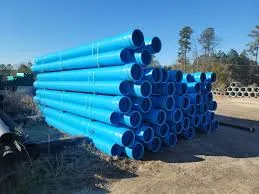Nov . 07, 2024 18:37 Back to list
HDPE Pipes for Reliable Water Supply and Efficient Service Solutions
The Role of HDPE Water Supply Pipes in Modern Infrastructure
High-Density Polyethylene (HDPE) pipes have become a cornerstone in the water supply industry due to their remarkable properties, making them an ideal choice for various applications in modern infrastructure. HDPE, a thermoplastic polymer, is known for its high strength-to-density ratio, making it a robust and durable option for water supply systems. As the need for reliable and efficient water distribution continues to rise, understanding the advantages of HDPE pipes is essential for both municipalities and commercial enterprises.
Durability and Longevity
One of the most significant advantages of HDPE pipes is their exceptional durability. These pipes are resistant to corrosion and degradation, which are common issues with traditional materials like metal and concrete. HDPE pipes can withstand harsh environmental conditions, including extreme temperatures, UV exposure, and chemical attacks. This resilience ensures a long service life of 50 years or more, reducing the need for frequent replacements and maintenance—factors that can lead to significant cost savings for water supply systems.
Flexibility and Ease of Installation
Another notable property of HDPE is its flexibility. HDPE pipes can be bent and coiled, allowing for easy installation in various terrains, including those that are rocky, uneven, or otherwise challenging. This flexibility means that fewer joints are required during installation, minimizing potential leak points. The lightweight nature of HDPE also makes handling and transporting the pipes significantly easier compared to heavier alternatives. As a result, construction projects can be completed more quickly and with less labor, which is particularly beneficial in emergency scenarios requiring rapid water supply restoration.
Environmental Benefits
In an age where sustainability is a significant concern, HDPE pipes stand out due to their environmentally friendly properties. They are made from recycled materials and can be recycled at the end of their lifespan, thereby contributing to a circular economy. Additionally, HDPE pipes have a lower carbon footprint during production and installation compared to traditional pipe materials. The reduced energy requirement for transport and handling further adds to their environmental advantages, making HDPE a responsible choice for water supply infrastructure.
hdpe water supply pipe service

Pressure Resistance and Flow Efficiency
HDPE pipes are known for their high pressure resistance, which is essential for maintaining consistent water flow in distribution systems. Their smooth internal surfaces reduce friction and promote efficient water flow, minimizing energy loss and ensuring that water reaches consumers effectively. This is particularly important in urban settings where water pressure tends to fluctuate due to varying demands throughout the day.
Cost Effectiveness
When considering the total life cycle cost, HDPE pipes often prove to be more economical than conventional options. While the initial investment may be slightly higher, the long-term savings generated from lower maintenance costs, reduced energy consumption, and extended lifespan make HDPE a financially sound choice. Furthermore, fewer interruptions due to repairs contribute to a more reliable water supply for communities and businesses alike.
Applications in Water Supply Systems
The versatility of HDPE pipes allows them to be used in various applications within water supply systems. They are suitable for potable water distribution, sewage systems, stormwater management, and irrigation. In urban environments, the use of HDPE pipes helps mitigate issues such as water deep sewer infiltration, thereby improving overall system efficiency and reliability.
Conclusion
The adoption of HDPE pipes in water supply systems signifies a shift towards more efficient, sustainable, and cost-effective infrastructure. Their durability, flexibility, environmental benefits, pressure resistance, and overall cost efficiency position HDPE as the preferred choice in modern water distribution applications. As the demand for reliable water supply systems continues to grow globally, the use of HDPE will likely expand, ensuring that communities gain access to quality water while minimizing environmental impact. With these advantages, HDPE pipes represent not only a practical solution but also a forward-thinking approach to addressing the water challenges of the future.
-
32mm HDPE Pipes Coil: Durable & Flexible Water Supply
NewsAug.05,2025
-
DN100 PVC Well Casing Pipes | Durable Corrosion-Proof
NewsAug.04,2025
-
HORON 25mm PPR Plumbing Pipes - AI-Enhanced & Reliable
NewsAug.03,2025
-
HORON 25mm PPR Pipes - AI-Optimized Plumbing Excellence
NewsAug.02,2025
-
Premier HDPE Sprinkler Pipe Manufacturers | Durable Solutions
NewsAug.01,2025
-
DN500 HDPE Double Wall Corrugated Drain Pipes | Durable & Efficient
NewsJul.31,2025

